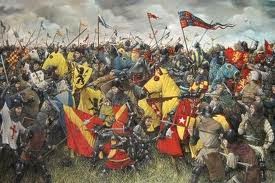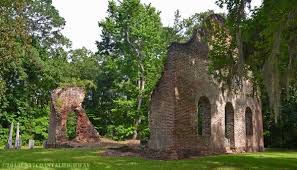Genealogy Validity Traces to About 1066 A. D.
The battle of Crecy in 1366 in northern France occurred during the war which lasted one hundred years. The weapons and tactics used in this war were for great benefit to the English when the knights fought dismounted, elbow to elbow alongside pikeman and archers. These tactics made the army of King Edward III a powerful foe to the French, who out-numbered them. A hundred years’ worth of war in Europe was uniquely a peculiar fight for power, especially since the armies were during the black death, etc. Since the Garden of Eden mankind has kept records. The record that Adam kept was called the Book of Remembrance. Had this book survived, we would be better informed today and lots of questions would be answered. But time passes and things happen, such as natural

disasters, flooding, fires, diseases, and other deluges, and that which was lost. It is a natural desire to write things down. Therefore, it is difficult to believe that the ancestors simply failed to leave a record of their activities. Luckily, the discovery of the Rosetta Stone breached the divide between languages. Still, there remains so much to be discovered about Nations and peoples that sank into oblivion. Yet, the inherent need of the researcher to discover certain truths causes the quest to push along and draw logical conclusions. So, where are we today record-wise? A legitimate genealogy can be traced back to the Domesday book of 1066 A. D., which was the first known tax of the common people in medieval times. Nevertheless, if you get to 1066, you have done quite well. This is because the 12th, 13th, and 14th centuries suffered from devastating plagues that very nearly killed whole populations. And during all of this, there were wars! Generally, then, one might conclude that this is the reason that the identity of certain progenitors was lost with the ages. The royal genealogies are traced back to the bible. But beware! Where were the records providing facts between, say, about 600 B. C. and 6000 B. C.? Much of the royal genealogies are replete with mistakes. Even the bible did not list all of the lineages of those days.

The Ruins on Highway 17 (coastal Highway
Several Revolutionary War skirmishes occurred in Colleton County and the state legislature met in the town of Jacksonboro in 1782 while Charleston was occupied by the British. In 1828 the first nullification meeting in the state was held in Walterboro. The Revolutionary War hero Isaac Hayne (1745-1781) was a Colleton resident, as were politicians Rawlins Lowndes (1721-1800) and William Lowndes (1782-1822 Cotton was king in the region. After the War Between the States, Northern carpetbaggers bought the land for taxes and used it as hunting preserves.